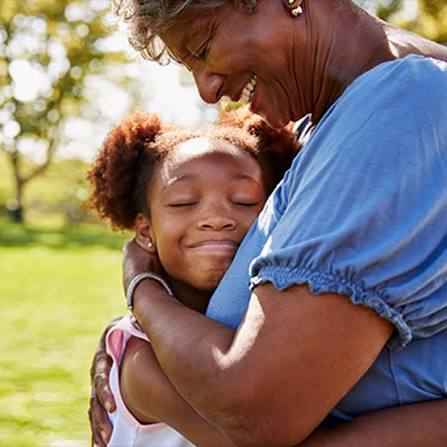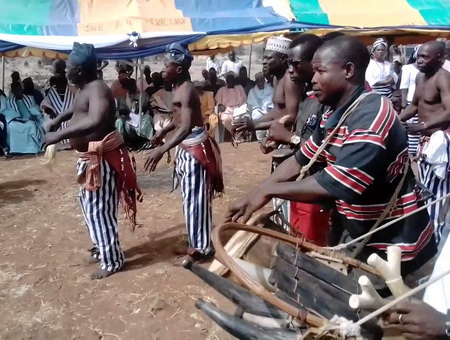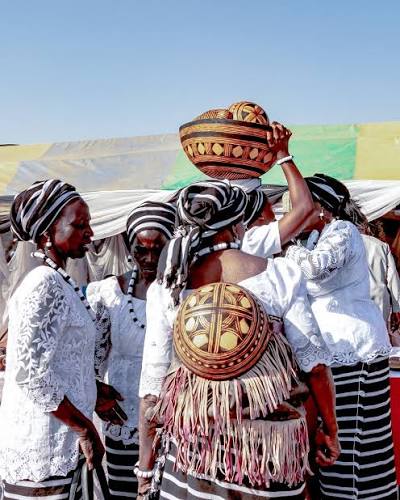
When my grandfather died, this was over fifteen years ago, almost twenty now, I learned something important about how we hold each other. I woke up very early, maybe four or five in the morning, and, being honest, I had barely slept when a sudden noise jolted me awake. My Big Mummy, the firstborn, went room to room singing praises of her father in our language.
I would learn from my Mother later in the day that what she did was called Jikatuwa. Jikatuwa, I write it here the way my family says it, it felt like the sound of the house itself remembering him. Tuwa is the part I can point to in a dictionary: in Bura, tuwa means “to cry.” So loosely translated, jikatuwa is the cry of bereavement offered every day after the death of a parent by their first daughter. It fits: a ritual cry, a way for the household to make grief visible, to name it out loud.
That morning stayed with me because it showed how music is not an add-on in our lives; it is the thing that organises them. For us Africans, the first impulse at a wedding, a harvest, a new baby, or a funeral is often the same: a song. Clap, shout, dance, cry, music is the grammar we all reach for when we need to speak without always finding the right words. The Bura people I come from are part of a wider web of communities across North-eastern Nigeria; our language, rituals, and dances are tied to place and history in Borno and Adamawa states. That everydayness of music, how it teaches language, history, and social law, is not just feeling; it is also how communities have preserved themselves for centuries. Oral traditions, chants, lullabies, epic songs, and funeral laments are the libraries of many African societies. They carry names, migrations, warnings, jokes, genealogies, recipes, and even maps of the land.

UNESCO calls these oral traditions and expressions central to keeping cultures alive; they are how knowledge is passed from one generation to the next without depending on books. In other words: songs are our textbooks, our archives, and our therapy rooms.
Across West Africa and beyond, griots, jeliw, and oral historians have long been the custodians of memory and moral order. They remind us that music and stories are not only for entertainment; they are social records and, at times, justice. When I sing a song my grandmother taught me, I am doing the same work: carrying information and feeling together, making them available to whoever will listen.
At home, songs taught me language the way school taught me grammar. My Grandmother would start a line in Bura, and my small mouth would fill in the rest. I learned words I had never heard in a classroom, and I learned the weight those words could carry. That is common across Africa: music teaches children idioms, history, religious practice, and a sense of belonging. Recent studies that look at oral traditions and indigenous musical practice show how vital this is for cultural continuity, how songs evolve but still hold on to core ideas. When a woman in a compound begins a praise song, she is doing more than praising; she is updating the family ledger, naming virtues and debts, inviting memory back into the room.

In the Bura culture, there are dances and songs for everything. We have the Bansuwe dance at weddings and other ceremonies; there are praise songs and laments that mark the rhythms of life. We do not separate joy and sorrow into different boxes and then go get music; the music is what lets us be both. Sometimes a funeral becomes a long, fierce concert of memory; sometimes a thank-you at a harvest is a quiet line of singing that lasts until the moon comes up. There are even recordings and collections that capture praise singing and the music of our villages, which is another way this work survives beyond a single household.
I lost my grandmother, my last surviving grandparent, in February, and even though I am very familiar with grief, it was and still is one of the most painful experiences of my life. So, when I sing the songs my grandmother taught me now, months after she died, I am doing more than remembering her voice. I am repeating a pedagogy: the sounds teach me how to say things in Bura that I might have lost otherwise. They remind me of where the words live on the body, in the pause before the chorus, in the way the line bends into laughter at the end. They reconnect me to the particular way our people respond to life: with a song that carries both gratitude and grief at once.

There is also something political about this memory work. Naming our music as language and history is a small act of preservation against erasure. Young people move to the city, languages shift, and instruments gather dust. The minute a grandmother’s song stops being sung, a strand of history frays. That is why recording, teaching in schools, and simply singing in living rooms matter. It is not nostalgia only; it is stewardship.
If there is a single thing I have kept in the months since she left, it is this: music does not let us forget ourselves. It holds the shape of the family when we cannot. It translates private grief into public ritual, so the weight is shared. It teaches the next child her mother’s name and the town she came from. It reminds us, again and again, that to be African is often to respond first with a song.
